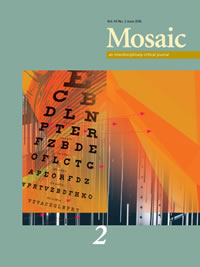Issue 49.2
Overview

General Issue
Published: June 2016
View the issue introduction or see the issue summary and contents below.
10 essays, totalling 192 pages
$21.95 CAD
Since its first publication, Mosaic has had two subtitles: from issue 1.1 (1967) to 12.4 (1979), a journal for the comparative study of literature and ideas; and from 13.1 1979) to 49.1 (2016), a journal for the interdisciplinary study of literature. With this issue, Mosaic introduces its third subtitle: an interdisciplinary critical journal. The subtitle reflects the interdisciplinary breadth the journal represents and will carry Mosaic forward into and beyond its 50th anniversary.
Idea Eater: The Conceptual Lyric as an Emergent Literary FormBrian Reed Approaching the conceptual lyric as an emergent literary form that adapts the conventional post-Romantic lyric to suit an age in which digital technologies are part of everyday life, this essay focuses on Chris Alexander’s Panda and Donato Mancini’s “Ligature.” | |
Epistemic Injustice and The Rape of LucreceMary Janell Metzger In his representation of the historic rape and suicide of Lucrece, Shakespeare challenges readers to avoid epistemic injustice by reflecting on the nature and credibility of their sources, the problem of judgment in a world of social inequality and political injustice, and the aesthetic relation between historical event and finite truths. | |
The ‘Vocabulary of Human Behavior’: Gesture in How the García Girls Lost Their AccentsPatrick S. Lawrence This essay contributes to existing scholarship on Julia Alvarez’s How the García Girls Lost Their Accents by considering how gesture functions in the novel’s exploration of Spanish-English bilingualism. Though gesture is construed as a more authentic register, the novel actually links it to nationally specific codes of class and gender performance. | |
Soulful Mathematics: Poetry and Icelandic ConceptualismEva Heisler The frequent allusion to poetry is a curious and distinctive feature of Conceptual art in Iceland. This essay explores the relevance of poetry to Icelandic Conceptualism through an examination of key works by artists Kristján Guðmundsson, Hreinn Friðfinnsson, Birgir Andrésson, and Hannes Lárusson. | |
Education, Science, and Secular Ethics in Alasdair Gray’s Poor ThingsJohn Glendening Alasdair Gray’s prize-winning novel Poor Things, postmodern in its game-playing with literary conventions, critiques, within a neo-Victorian historical frame, oppressive institutions and ideologies but not without subjecting its own social agenda to contestation. Through this process it enacts a form of education that replaces corrupted religion with socially responsible science. | |
Travels in Subjectivity: Post(Genomic) Humanism in Ursula K. LeGuin’s Changing PlanesJill LeRoy-Frazier Travel literature conventionally treats the traveler’s hegemonic encounter with difference; in her mock travel narrative Ursula LeGuin imagines how the postmodern traveler in a global, biotechnological age might begin to develop a more cosmopolitan understanding of diversity by means of a radical rethinking of Western preconceptions about ontology, self, and subjectivity. | |
Subjectivity as Alterity in Seamus Heaney’s PoetryM. Reza Ghorbanian K. In Seamus Heaney’s poetry, the subject challenges and dissociates himself from the Other in order to create his own self. He becomes a stranger to society and is exiled. The distance paves the way for creating the self and affirming his identity as an independent subject. | |
Marriage, Myths, and Fairy Tales in Diana Abu-Jaber’s Arabian JazzIbis Gómez-Vega In Arabian Jazz, Diana Abu-Jaber works with the cultural imperative that girls must get married but wickedly employs Greek myths, fairy tales, and American popular culture to deconstruct the traditional story of marriage at any cost and create an “in-between” space where her heroines, Melvina and Jemorah, can adequately define themselves as Arab-American women. | |
The Criminal Trial of Anne Hutchinson: Ritual, Religion, and LawLisa McGunigal I explore the ways in which Anne Hutchinson invalidated her criminal trial in seventeenth-century Massachusetts as she challenged the judicial process by showing that, instead of adhering strictly to the law, the magistrates depended on ritual to find her guilty. | |
Black and White and Read All Over: Photography and the Voices of Richard WrightJason Puskar Richard Wright’s 1941 photo-text 12 Million Black Voices reveals a deep conflict between traditional African-American commitments to language and literacy and new possibilities emerging in the medium of photography. Ironically, given its integrationist stance, Black Voices reconstitutes the social separation of races as a separation of media forms. |